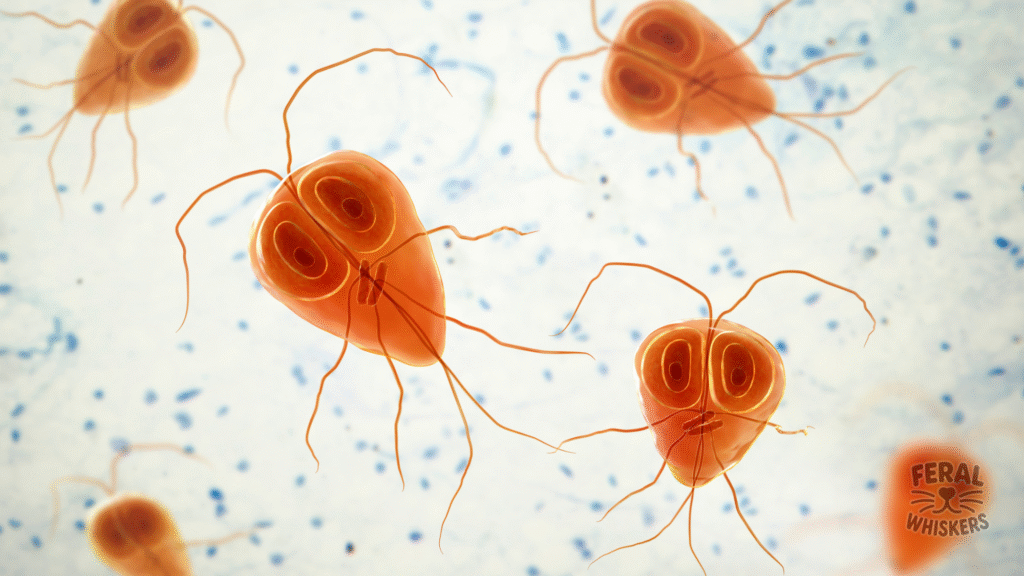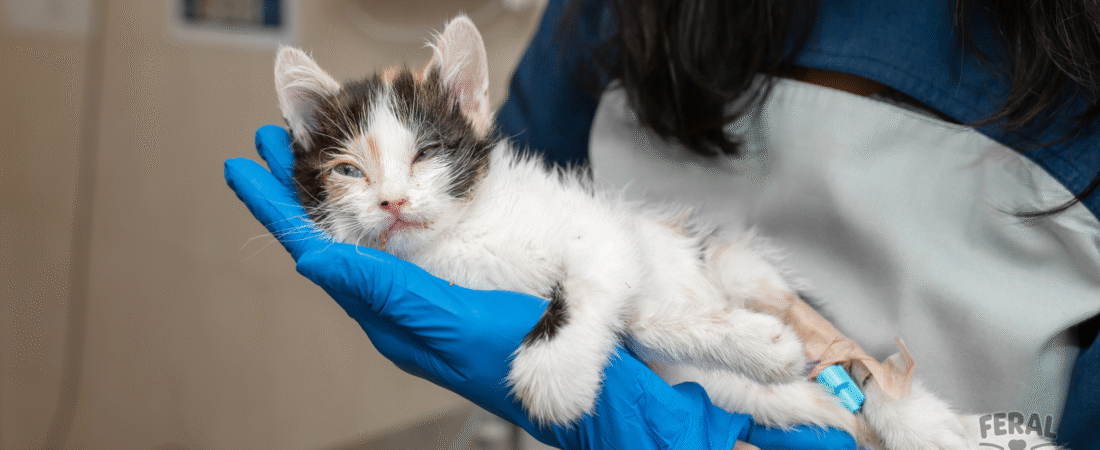📌 What is Giardia in Cats?

Giardia is a microscopic protozoan parasite (not a worm) that infects the intestinal tract of cats, causing digestive issues—especially watery diarrhea.
- Species: Giardia duodenalis (also infects humans, dogs, and other animals).
- How it spreads: Cats pick it up by swallowing tiny cysts in contaminated water, food, litter boxes, or while grooming.
- Why it matters: It causes persistent, sometimes explosive diarrhea, dehydration, weight loss, and is highly contagious among cats.
🦠 How Do Cats Get Giardia?
- Contaminated water: Drinking from puddles, shared bowls, or unclean sources.
- Dirty litter boxes: Giardia cysts survive in moist environments.
- Grooming: Cats licking paws/fur contaminated with cysts.
- Cat-to-cat spread: Grooming each other or sharing bowls.
- Environment: Giardia cysts can live for weeks in damp areas like carriers, kennels, and litter boxes.
🚨 Symptoms of Giardia in Cats
Giardia primarily affects the digestive system:
- Diarrhea (soft, greasy, foul-smelling): Often intermittent but persistent.
- Weight loss: Despite normal appetite, nutrients aren’t absorbed.
- Gas, bloating, abdominal discomfort.
- Dehydration: Due to constant diarrhea—especially dangerous for kittens.
- Unkempt fur: Loose stools soil fur around the anus and back legs.
- Asymptomatic carriers: Some cats shed parasites without showing signs.
🔍 Diagnosis
- Fecal exams (microscopy): Can catch cysts, though they may be missed.
- ELISA antigen test / SNAP test: Detects Giardia antigens—more reliable.
- PCR testing: Highly sensitive test in chronic cases.
⚠️ Because Giardia cysts are shed intermittently, sometimes multiple stool tests are necessary.
💊 Veterinary Treatment for Giardia in Cats
Giardia can be stubborn to clear, often requiring multi-step treatment:
- Metronidazole: Common antibiotic/antiprotozoal; reduces symptoms and parasite shedding.
- Fenbendazole (Panacur®): Anthelmintic that also works against Giardia; safe for cats.
- Combo therapy: Used when single meds don’t fully clear infection.
- Supportive care: Fluid therapy for dehydration, probiotics for gut recovery.
- Hygiene is critical: Without cleaning, reinfection happens very quickly.
🌿 Holistic & Kitchen Supports for Cats with Giardia
While veterinary meds are essential, holistic supports strengthen recovery and reduce recurrence:
🥛 Probiotics & Goat Kefir
- Restore healthy gut bacteria after diarrhea.
- Strengthen digestion and immunity to resist reinfection.
🥥 Coconut Oil (Unsweetened)
- Contains lauric acid, known for anti‑protozoal effects.
- Use: ⅛ teaspoon mixed into food a few times weekly.
🥒 Pumpkin or Pumpkin Seeds
- Pure pumpkin purée adds fiber to firm stool.
- Ground pumpkin seeds contain cucurbitacin, mildly anthelmintic.
🍎 Apple Cider Vinegar (ACV)
- May help create a gastrointestinal environment less favorable to protozoa.
- Use: A couple drops mixed with food; introduce slowly.
🌿 Slippery Elm Bark Powder
- Gentle, natural GI soother that reduces irritation from diarrhea.
- Use: Vet-approved cat dose mixed into wet food (safe, non-toxic).
⚠️ Note: Holistic supports improve digestion and resilience but do not replace prescription treatment. Giardia often needs both.
🏡 Environmental & Home Hygiene
Reinfections are common—hygiene must be strict:
- Scoop litter multiple times daily and disinfect boxes with hot water + pet‑safe cleaner.
- Wash bedding weekly in hot water and dry thoroughly.
- Wipe cat bottoms and fur after diarrhea episodes to prevent self-reinfection.
- Steam clean carpets and furniture in multi-pet homes.
- Frequently disinfect bowls, carriers, toys with boiling water or bleach solution (rinsed well).
- Isolate infected cats in severe outbreaks until symptoms improve.
🛡️ Prevention
- Clean water: Always provide fresh, filtered, uncontaminated water.
- Litter hygiene: Scoop daily and clean regularly.
- Flea & pest control: Prevent pests that spread Giardia cysts.
- Routine vet exams: Annual fecal checks, especially in multi-cat homes.
- No outdoor roaming: Reduces hunting and dirty water exposure.
🌱 Quality of Life
- With treatment, most cats recover quickly.
- Kittens or immunocompromised cats need early, aggressive care.
- Holistic supports shorten recovery and improve digestion post-infection.
- Without treatment, chronic diarrhea, weight loss, and dehydration can damage long-term health.
❓ FAQs
Q1: Can humans catch Giardia from cats?
Yes. It is zoonotic. Proper hygiene (washing hands, cleaning litter boxes) is critical.
Q2: Can cats get Giardia more than once?
Yes—reinfection is very common if the environment isn’t cleaned.
Q3: Do pumpkin or coconut oil cure Giardia?
No—only support gut health. Veterinary treatment is required.
Q4: Is Giardia fatal in cats?
Rarely in adults, but kittens may die from dehydration if untreated.
💡 Final Thoughts
Giardia in cats is a nasty but manageable parasite. It spreads fast in multi-cat homes and can linger in moist, dirty environments. Successful management requires:
- Veterinary medication (metronidazole, fenbendazole).
- Holistic gut supports (pumpkin, coconut, probiotics, slippery elm).
- Strict hygiene to break the reinfection cycle.
✅ Key takeaway: Treat promptly, clean thoroughly, and support naturally for a Giardia‑free cat household.

